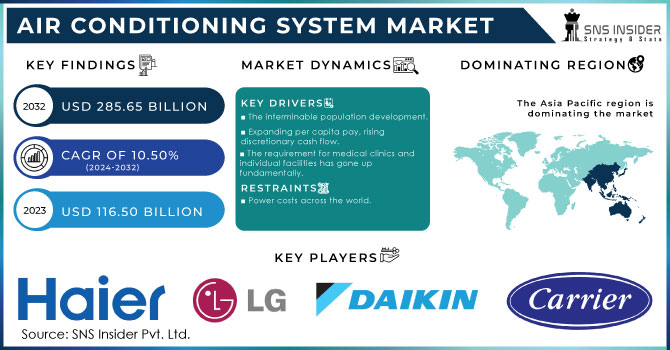The global air conditioning (AC) system market is poised for substantial growth as rising global temperatures, increased urbanization, and growing demand for energy-efficient cooling solutions continue to drive the industry. With climate change contributing to higher temperatures and more extreme weather conditions, the need for air conditioning systems across residential, commercial, and industrial sectors is increasing. As consumers and businesses seek improved comfort and energy efficiency, the air conditioning system market is expected to expand significantly, with new technological innovations shaping its future.
The Air Conditioning System Market size was valued at USD 116.50 Billion in 2023. It is expected to grow to USD 285.65 Billion by 2032 and grow at a CAGR of 10.50 % over the forecast period of 2024-2032.

Key Market Drivers:
- Rising Global Temperatures and Climate Change: The global rise in temperatures, driven by climate change, is one of the primary factors pushing the demand for air conditioning systems. As cities around the world experience hotter summers and more frequent heatwaves, both residential and commercial sectors are investing in efficient air conditioning solutions to ensure indoor comfort. This trend is especially prominent in regions such as the Middle East, Asia-Pacific, and parts of North America.
- Urbanization and Infrastructure Development: With the ongoing trend of urbanization, particularly in developing countries, there is an increased demand for air conditioning systems in residential and commercial buildings. The expansion of infrastructure, including office buildings, shopping malls, hospitals, and educational institutions, is driving the growth of the air conditioning market. Additionally, the growth of the hospitality industry, including hotels and resorts, is further contributing to the demand for advanced air conditioning solutions.
- Energy Efficiency and Environmental Concerns: The demand for energy-efficient air conditioning systems is growing as both consumers and governments become more environmentally conscious. The increasing adoption of energy-efficient technologies, such as inverter-driven compressors and smart thermostats, is helping reduce energy consumption and operating costs. Additionally, stricter environmental regulations aimed at reducing greenhouse gas emissions are pushing the adoption of eco-friendly refrigerants and energy-saving solutions in air conditioning systems.
- Technological Advancements in AC Systems: Innovations in air conditioning technology are making systems more efficient, affordable, and user-friendly. Smart air conditioners, which can be controlled remotely through smartphones and integrated with home automation systems, are gaining popularity. Additionally, advances in variable refrigerant flow (VRF) systems and geothermal cooling are revolutionizing the industry by providing customizable, energy-efficient solutions for large buildings and commercial spaces.
- Increasing Disposable Income and Rising Living Standards: Rising disposable income, particularly in emerging economies, is enabling consumers to invest in air conditioning systems for their homes and offices. As living standards continue to improve, the demand for indoor comfort and climate control is also rising. This is especially true in rapidly growing urban centers in countries such as China, India, Brazil, and Southeast Asia.
Market Segmentation:
The air conditioning system market is segmented by product type, application, and region:
- By Product Type: Split Systems, Window ACs, Centralized ACs, Portable ACs, and Others.
- By Application: Residential, Commercial, Industrial, and Others.
Technological Innovations and Future Outlook:
The future of the air conditioning system market is set to be shaped by continuous advancements in technology aimed at improving efficiency, sustainability, and user experience. Smart AC systems integrated with IoT (Internet of Things) and artificial intelligence (AI) will allow consumers to control their air conditioners remotely, track energy usage, and adjust settings to optimize comfort and energy consumption. This trend toward smart homes and smart cities is expected to be a significant growth driver for the air conditioning industry.
In addition, the development of low-GWP (Global Warming Potential) refrigerants and sustainable materials is helping manufacturers comply with increasingly stringent environmental regulations. The shift towards hydrofluoroolefin (HFO) and natural refrigerants like CO2 is contributing to the development of environmentally friendly and energy-efficient air conditioning systems. Moreover, the use of solar-powered air conditioning systems is gaining traction as an eco-friendly alternative for cooling solutions, especially in regions with abundant sunlight.
As energy costs continue to rise and sustainability becomes a top priority, consumers and businesses will increasingly turn to energy-efficient systems that offer long-term savings. Geothermal cooling and district cooling systems, which provide sustainable cooling solutions for large-scale commercial developments and cities, are expected to see growing adoption, particularly in urban areas.
Key Players
- Haier Group Corporation
- LG Electronics Inc.
- Daikin Industries Ltd.
- United Technologies Corporation
- Hitachi-Johnson Controls Air Conditioners Inc.
- Carrier Corporation
- Mitsubishi Electric Corporation
- Mahle GmbH
- Denson Corporation
- Calsonic Kansei Corporation
- Sanden Holdings Corporation
- Eberspaecher Holding GmbH & Co.
- Valeo SA
- Keihin Corporation
- Subros Limited
Conclusion:
The global air conditioning system market is on track for robust growth, driven by increasing demand for energy-efficient cooling solutions, technological advancements, and the ongoing trend of urbanization. As global temperatures rise and consumer demand for comfort and sustainability increases, air conditioning systems will play a pivotal role in improving indoor environments across residential, commercial, and industrial sectors. Companies that focus on energy efficiency, smart technologies, and eco-friendly refrigerants will be well-positioned to capitalize on the expanding market. With the ongoing evolution of air conditioning technology, the future of the market promises even more innovative solutions for consumers seeking improved comfort, cost savings, and environmental responsibility.
For more details @ https://www.snsinsider.com/reports/air-conditioning-system-market-1128
Contact Us:
Akash Anand – Head of Business Development & Strategy
info@snsinsider.com
Phone: +1-415-230-0044 (US)









